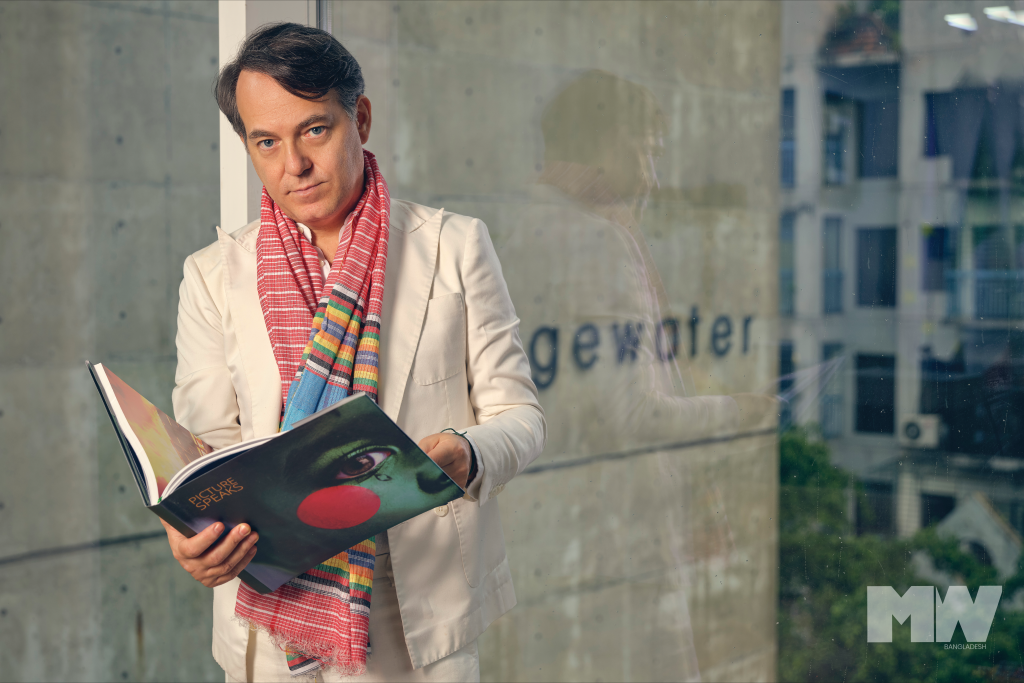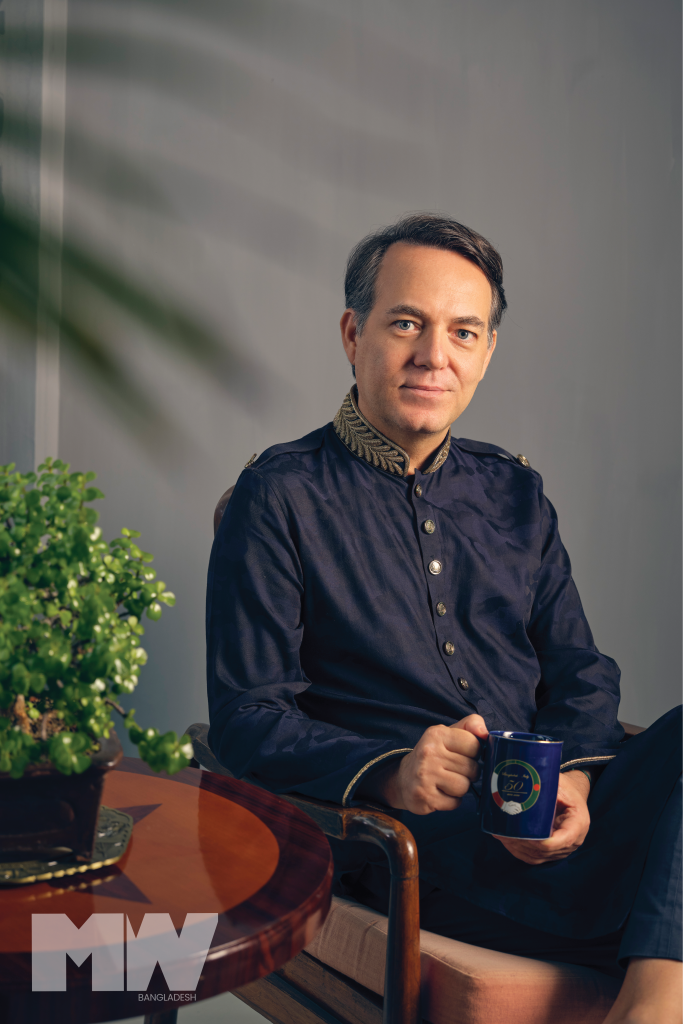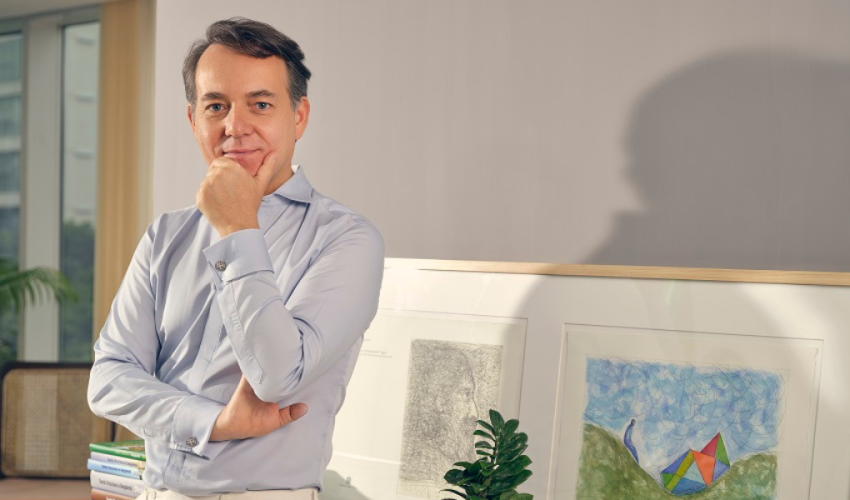A rainy-day chat with Ambassador Enrico Nunziata
By Sabrina Fatma Ahmad
Ambassador Enrico Nunziata, the current Italian envoy to Bangladesh, has been instrumental in strengthening the bilateral ties between the two countries, especially in the areas of trade, migration, security and culture.
During his tenure in Bangladesh, Ambassador Nunziata has witnessed some remarkable achievements in the bilateral relations. He was present when Prime Minister Sheikh Hasina visited Italy in 2020 and signed several agreements on economic cooperation, climate change, education and health. He also facilitated the reinsertion of Bangladesh in the list of countries whose nationals can benefit from a quota for work visas in Italy, resulting in more than 12,000 visas issued from 2021-2022. He has been advocating for legal pathways for migration and preventing irregular migration and trafficking.
Ambassador Nunziata has also been keen to promote collaboration in the defense industry, cultural exchange and security matters. He is working on finalizing a memorandum of understanding on cultural programs and another one on security cooperation.
He has also been active on social media, sharing his views and experiences on various aspects of Bangladesh, such as its history, culture, nature and people. He has expressed his admiration and respect for the country’s independence struggle and its development achievements.
With his meaningful tenure in our country coming to an end, MWB dropped in for a cup of coffee at the embassy on Madani Avenue, on a drizzling June afternoon.
BEST FOOT FORWARD
After completing all security protocols and being ushered through a tiny maze of corridors into the sunlit office of the Ambassador, we are greeted by the man himself, dressed in an impeccably cut navy suit that matches his eyes. He walks us through wardrobe options he’s selected for our shoot, settling on Zurhem, who have an ongoing collaboration with Zegna, as a sartorial nod to the theme of the bilateral relationships between our country and his.
“I always had this passion for clothes. I always chose what to wear as a child,” he reminisces, adding that he would always pick his own clothes when his parents took him shopping. “I’m talking about the 70’s, when the families had tailors. Clothes were made by the tailor, not only in shops. Of course, we started to lose this habit by the 80’s. But I remember also choosing the fabric, and the style, and correcting the tailor to make it more for my taste. I always had a passion for that. I think that is important. What you wear, for me clothes are important because they represent the self.” He brings us back to the present by talking about promising fashion designers he has interacted with in Bangladesh, and Bangladeshi designers based abroad, and echoes what several insiders in our apparel sector have said, about the growth in our RMG sector placing us in a position to join the ranks of global tastemakers if we play our cards right.
He politely tries to mask his wince as I butcher the pronunciation of ‘sprezzatura’ and answers the question I ask about his opinion on how Bangladesh can find its unique voice as global influencers of style. “Be authentic” he replies, adding that it is important to be aware of one’s own story and purpose when making choices, which ultimately gives one a unique style.

A VISION
Steaming cups of espresso arrive, prompting a discussion on coffee culture. Ambassador Nunziata talks about his three cups a day routine, about the joy of finding Lavazza coffee in Dhaka, which allowed him to sip a taste of home, about how for Italians, a quickly downed espresso to start the day is a very solitary act, and about enjoying the coffee served at the cafeteria at the Drik gallery. As the conversation begins to turn nostalgic, it’s time to push the clock back even further, to the beginning of the Ambassador’s journey into diplomacy.
“I was a very curious kid. And I was very active. Already very sociable”, he recalls. The last of four children, a young Enrico Nunziata felt an urge to keep up with his older brother and two older sisters, so he was always trying to read above his level, push himself to learn faster, to be able to communicate with the teenagers always populating the house he grew up in. A good memory helped; he entertains us with anecdotes of being fascinated by maths and science and being able to remember the names of all the bones, which he learned while studying anatomy. The Ambassador readily admits he enjoyed the spotlight, so he was always taking initiative, making friends, singing and acting in school.
The idea of becoming a diplomat came as he grew into a contemplative teen; an odd notion for someone who had no diplomats in the family to think of as role models. But once the idea took root, he researched on the subjects he would need to study, and the skills he would have to cultivate in order to become a diplomat. His Excellency has a degree in political science from the Eastern University Institute in Naples.
“In this job, and with any job, you have to be creative. There are rules you have to follow, of course, but you have to add something of yourself, add value , and make it yours, and make the job evolve, with other people that represent your generation, because it has to be a collaboration for meaningful evolution”
Ambassador Nunziata joined the diplomatic career in 1996. He says that diplomacy has changed a lot since then. “This is a job that has to adapt to society, to the international conjuncture, the evolution of democratic processes, multilateral processes.” When asked about the best part of his work, he replies. “There are many jobs and all jobs can give a contribution to society, but this job is much more particular in that you can be part of the history of the decision of your government. My report can read like a historiography. In the future it can be used to understand that particular period. Maybe in 50 years, when people study the relationship between the EU and Bangladesh. How the relationship contributed to our bilateral relationship, they will look to see what I had to say.”

COMMON THREADS
Prior to his tenure in Bangladesh, Ambassador Nunziata has served in various missions around the world, including Khartoum, Tirana, Moscow and Chisinau. Having studied Russian and English in university and chosen to study the history of Eastern Europe, he felt a natural affinity with the area, and eventually ended up spending eight years in Russia, and considers Moscow his ‘second home’.
Coming to Bangladesh and learning of its socialist-leaning past, and friendship with the Soviet Union during the Liberation War, he was struck by certain observable affinity. “But most important thing I see in common with Bangladesh and countries like Russia is this dynamism for development. I came four years ago but I see already extraordinary changes in the level of infrastructure. Padma bridge, airport being built, metro, and all the buildings. Sometimes you look out the window, and see a building that wasn’t there a month ago.” While some may not like the chaos of Dhaka, the Ambassador seems to adore the bustle. “So vibrant and so dynamic, you cannot feel alone” is how he describes it, adding that the present infrastructural problems, such as pollution and traffic jam should hopefully also fade in the near future if smart choices are made about clean energy.
FABRIC OF SOCIETY
Having arrived in this country exactly a year before the Covid outbreak, his Excellency describes his experience as a ‘washing machine’. “I accepted all invitations. I was living 24 hours a day.” The network he built in the year before the world went under lockdown helped him cope with the isolation that came immediately afterwards. “I think social life is extremely important for a diplomat. Otherwise you cannot understand a country. I have friends from youngsters to members of Parliament, ministers. I have interacted with all categories, artists, intellectuals, businessmen, common people, traveling as much as I could inside the country. I had the good fortune to understand the country from the grassroots levels, to interact with the indigenous level.”
“This is something that I will always remember about Bangladesh. I see everybody doing something. Everybody has a small job. And this is the resilience of the country and the strong power of the country. You will always go ahead.”
He tells us about enjoying the Heritage Walk in Old Dhaka, of the array of dishes he tried in the end, which prompts members of our team to begin quizzing him about different local dishes, and he submits to the interrogation, charming everyone with a demonstration of Bangla phrases he has learned. He discloses that on a personal level, he tries to eat a healthy, low spice, low sugar, mostly plant-based diet, but is happy to try the variety of meat-based local foods when the occasion calls for it. “Dal, I love dal!” he declares.
In talking about his tours of the heritage sites and museums, he mentions being impressed by the wealth of our architectural heritage, but wishes more was done in service of their upkeep. “You have beautiful museums, and this is not a critique, but I think it [artefacts of your ancient history] must be valorized much better.” To underscore his admiration for our structures, he references the Friendship Hospital in cyclone-prone Satkhira which was recognized by the Royal Institute of British Architects as ‘the best new building’, and calls our national Parliament building a ‘masterpiece’.
As much as he loves the bustle of Dhaka, Ambassador Nunziata professed himself charmed by the serenity of the countryside. Idyllic scenes of the lush green paddy fields, and the blood red sun sinking into the horizon makes him recall the flag and the ways in which the symbolism is intertwined not only with our history, but with the very topography of our lands.
“This humanity, dynamism, the peaceful life. These are things that are beautiful and I will remember,” he says, getting slightly emotional.
We break for photos and the Ambassador switches from his navy suit to an all-white ensemble, which he accessorizes with a colorful gamcha, and then a band-collared panjabi in deep midnight blue, with epaulettes as a slight nod to military fashion. Our final question when we resume, is to wrap up the conversation with a comment about the future of our bilateral relations.
He talks about the large Bangladeshi community residing in Italy, and the bilateral flow of investments between Bangladesh and Italy. He mentions the growth in trade volume between the two countries, standing at 2.7 billion euros at last count. “My action during these years was really to expand these relationships, with the signing of different agreements in energy, defence, with political consultations, and so on.” He briefly talks about the work to be done in various sectors, diversifying the trade options to include chemicals, satellites, and more. “It’s very dynamic. Because Bangladesh is a dynamic country, also our economy is very dynamic, and we have found many similarities in our economies and avenues of possible investment” he concludes.
As the day went from overcast to a regular downpour, we ended the conversation on a cheerful, slightly sentimental note, and parted ways with smiles on all sides. MWB wishes Ambassador Nunziata all the best in his next adventure.














